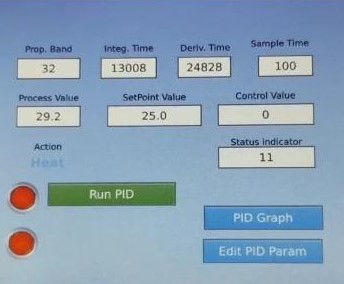AGRONOVA presently build stationary pressure vessels with a filling volume of 1,500 L, with construction drawings and welding procedures already approved approved upon, in compliance with EU-PED, and certified by the national inspection agency, KIWA-INSPECTA.
By default, the vessels are equipped with a mixer/rotator powered by a frequency-controlled motor and worm-gear. This is to reduce the lag-time until diffusion of volatile aromas take place within oil-bearing plant cells. Mixer usage during distillation can increase the essential oil yield and/or reduce the overall distillation time compared to conventional systems.
The systems can be controlled and optimized with advanced process regulation functions using PID-controlled valves and a sophisticated PLC system using our own developed programming functions. Thus, each unique distillation event can be automated and controlled dynamically over time to optimize product quality and to make use of input energy efficiently.
We also use a modular approach by which vacuum distillation technology can be incorporated with steam distillation and comply with the original pressure vessel, condenser, and flroentine flask design (these units are already built and approved by the certifying agency to meet with vaccum regimes). By this, the distiller can have access to a unique combination of vacuum and steam distillation technologies in one processing unit. Vacuum distillation may, in cases, be the preferred choice as the steam equilibrium temperature is reduced and does not impose the same risk of heat-induced artefacts on product quality as with steam distillation. It is not until now that the distiller has been able to make an enlightened decision on which distillation technology to use for a particual crop and event, without having to change the processing equipment.
Our mobile solutions can use pressure vessels up to 1,500 L filling volume and are mounted onto a tandem-trailer in combination with a durable, adjustable and low-weight aluminium framework (FlexLink structural elements). The mobile systems can be equipped similar options as the stationary units, such as advanced process regulation functions, semi-closed vacuum circuit, etc.


